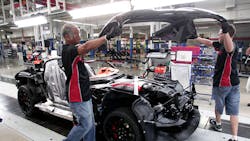AUTO ROUNDUP: Hot Streak Continues for US Auto Sales
Boosted by sport utility vehicles, Automakers reported strong U.S. sales in July, with the industry benefiting again from lower gasoline prices and a steadily improving American economy.
Overall sales rose 5.3% from a year ago to 1.51 million vehicles in July, according to Autodata. That puts the annual rate of U.S. auto sales at 17.55 million, the third straight month above 17 million cars, a torrid sales pace.
“Right now, the industry is genuinely vibrant, benefiting from robust consumer demand that is enabling automakers to pull back incentive spending,” said John Krafcik, president of TrueCar, an automotive pricing and information service. “Consumers are feeling more affluent, and with more disposable income to invest back into the economy, the auto sector is thriving.”
The hot market is translating into higher prices for cars. The average price of a car sold in July was $33,453, up 2.6% from July 2014, according to Kelley Blue Book.
General Motors said July sales surged 6% from a year ago to 272,512 vehicles behind a strong performance in pickup trucks, SUVs and some sedan lines, while Ford notched a 4.9% rise in sales to 222,731, a gain that included an 11% rise in Ford SUVs.
Fiat Chrysler’s July sales came in at 178,027 vehicles, up 6.2% from the year-ago period and about 2,100 above the level projected by online car site Edmunds. Toyota reported sales of 217,181 vehicles, up 0.6% from a year ago, as Camry was its best-selling car in July. Lexus luxury utility vehicles revved almost 28% higher and the Toyota Highlander gained more than 12%. Takoma and Tundra pickup sales were up nearly 17%.
Honda sales rose 7.7% to 146,324, with especially strong gains in its popular CR-V “crossover” vehicle. Sales of the Civic sedan rose by 3.7%, while the Accord, another sedan, fell by 1.6%. Nissan sales rose 7.8% to 130,872 units, missing the Edmunds forecast of 132,388. The Nissan Rogue SUV remained a strong seller, with a 50.9% increase.
The sales figures from GM, Ford, Fiat Chrysler, Honda and Toyota were all higher than the increases projected by Edmunds, which had given a bullish forecast on July after U.S. automakers enjoyed a buoyant first half of 2015 thanks in part to lower gasoline prices.
TOYOTA: TOKYO — Toyota said quarterly net profit jumped 10% from a year earlier and raised its fiscal-year revenue forecast, but warned over prospects in China.
The company reported net profit of 646 billion yen ($5.21 billion) in the three months to June, beating analyst expectations, while revenue rose 9.3% to 6.98 trillion yen ($6.29 billion). Its sales, however, were slightly lower in the period and it trimmed its 2015 calendar year sales forecast to 10.12 million vehicles from 10.15 million units.
Toyota — which also said its fiscal year to March revenue would be slightly higher than the expected 27.8 trillion yen ($224.21 billion) — credited a weak yen and cost cuts for its latest financial results.
Separately, Toyota said it was reorganizing its Chinese operations, including adding a production line at a plant in the northern city of Tianjin with an annual capacity of 100,000 vehicles to replace an older assembly line. The changes underline a “commitment to plants that are competitive, rather than plants that simply aim to maximize production.”
BMW: FRANKFURT, Germany — BMW said that weaker demand from China could weigh on its full-year earnings, as it reported a slight drop in its second-quarter profits.
CFO Friedrich Eichiner said the world’s most populous country, a robust source of growth for German car manufacturers in recent years, was now a riskier market. He added that “the second half will be more heavily burdened by investments, development costs and personnel costs,” and that “if the challenges in the Chinese market increase, we cannot rule out an impact on our forecasts.”
BMW said it had sold 230,700 cars in China during the first half, a modest increase of 2.3% compared with the same period last year. China remains the world’s biggest car market but a slowing economy, rollercoaster stocks and car plate restrictions in some cities to reduce pollution have hurt demand.
China’s overall auto sales reached 23.49 million vehicles last year, jumping 6.9% from 2013, but its Association of Automobile Manufacturers expects the increase to slow to around 3% this year.
Copyright Agence France-Presse, 2015
About the Author
Agence France-Presse
Copyright Agence France-Presse, 2002-2025. AFP text, photos, graphics and logos shall not be reproduced, published, broadcast, rewritten for broadcast or publication or redistributed directly or indirectly in any medium. AFP shall not be held liable for any delays, inaccuracies, errors or omissions in any AFP content, or for any actions taken in consequence.
